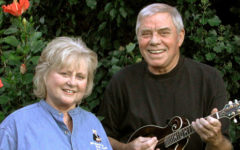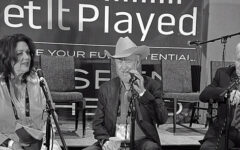![]() This post is a contribution from Terri Holloway, one of our 2010 IBMA correspondents. See her profile here.
This post is a contribution from Terri Holloway, one of our 2010 IBMA correspondents. See her profile here.
 Once again, I had the fun of being an interview observer (aka, being the fly on the wall). This time with Si Kahn, master songwriter, and lifetime member of IBMA. He became a lifetime member, he said, “for the love of the music. IBMA’s World of Bluegrass is the gathering place for all of us. It’s like a bluegrass family reunion.”
Once again, I had the fun of being an interview observer (aka, being the fly on the wall). This time with Si Kahn, master songwriter, and lifetime member of IBMA. He became a lifetime member, he said, “for the love of the music. IBMA’s World of Bluegrass is the gathering place for all of us. It’s like a bluegrass family reunion.”
“This is a celebration, but it’s also a place where I do my work. I’m a songwriter. This is a celebration,” he restated, “but I’m also talking to people about whether or not they need a new song.” Then he shared that the greatest compliment a songwriter can receive is to have another artist tell him that one of his songs will be on that artist’s next CD. That’s when, he says, the emotion of the song can really come out.
As a professional writer he doesn’t get emotional about his songs. He lets the artist do that. Kahn compared himself to a building framer. He roughs out the building framework and then the finishing carpenter comes along and puts all the details in: “I have a set of words, a set of notes that are approximate, a set of chords which may not be the chords the artist hears, and an approximate rhythm. When someone records one of my songs, it then comes back to me as a better song,” he said, “It’s got all the details in place.”
He related the story behind Custodian, now on his new album Courage. The story, he told us, came about when he was giving an NPR interview on KBOO, in Portland, Oregon, about a book on privatization (The Fox in the Henhouse: How Privatization Threatens Democracy) that he and his wife, Elizabeth Minnich, had just published, when a man named Grant called in and shared how he had lost his job as a custodian because the school district where he worked had decided to save money and privatized janitorial services. Grant related how much he and the children at the school where he worked had lost as a result of this cost saving plan.
(The story’s outcome, which isn’t in the song, has a happy ending – the Oregon Supreme Court heard a lawsuit relating to Grant’s situation and ruled in the School Employees International Union’s favor and all those displaced during this “take-over” were offered their old jobs back.)
Grant’s story is the kind Kahn loves. He says that taking something as complex as War and Peace and condensing it into a two and a half minute story-song is the tough part. The listener has to care about the main character by the second verse and it’s got to have a twist leading up to the resolve at the end of the song. This structure is what hooks the listener. When the story is a personal one, Kahn said, he has the song fact-checked and approved by the characters involved. All this, he continued, is part of his code of ethics, not just as a songwriter, but as an activist and human.
The last line in Custodian is a reference to multi-national corporate greed, says Kahn. “It’s not about the small business or mom and pop owner.” This, he said, is about community.
This isn’t the first time Kahn has visited this theme in his music. Back in 1972, he wrote another piece, called Aragon Mill about textile mills in the southern US closing. At that time, he said, “there were one million textile workers. This was the southern middle class, supporting their families and sending their children to college to become our doctors and teachers. Now there’s fewer than 10,000.” The song that evolved from this situation, without any help from it’s author, has grown until even Kahn admits it’s taken on a life of it’s own. Everyone who has recorded it adds their own touch, which is just fine, according to the songwriter. “Never trust the songwriter’s judgment of his own songs,” he said. When first written and recorded he didn’t particularly like the piece. He’s since learned to enjoy the metamorphosis of the piece from it’s six original verses with no chorus into the Aragon Mill played at bluegrass jams across the country. In fact, he said, his favorite version was recorded with the original fifth verse becoming the chorus and sung after verse two, again after verse four and finally after verse five. As that verse says, “weave and spin…”
Kahn’s own working philosophy: “I write songs, I do concerts, and I do CD’s that make people laugh, fall in love. I want to uplift people, not discourage them.” He wants us to remember that, “bluegrass is the working class music. It tells the truth about people’s lives.” Because of this, he says, his well is broad and wide and rooted in tradition. If you listen closely to the lyrics in his music you’ll hear the echos of the past.
Weave and spin…







